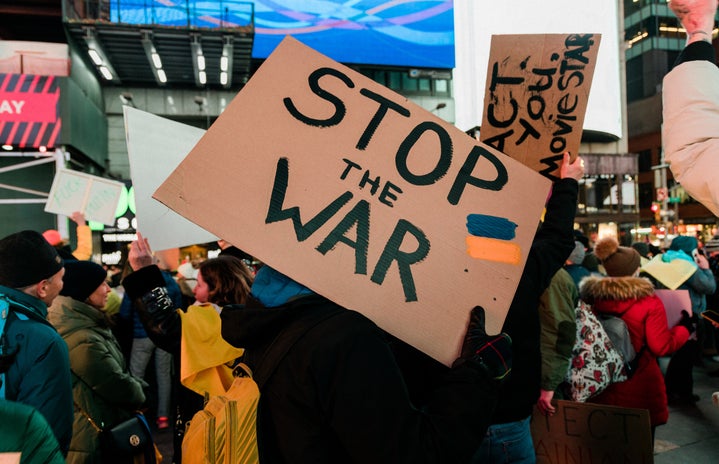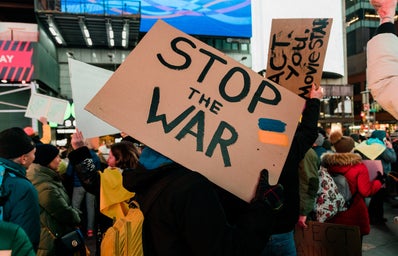Unless you’ve been living under a rock, you’ve heard of the Russo-Ukrainian War and its impact on not only the citizens of Ukraine but how the rest of the world, civilians and world leaders alike, have responded to the devastating invasion since Vladimir Putin declared war on February 24th.
The news reports are mortifying: According to the United Nations, as of March 20th, 2022, at least 925 civilians have been killed, including 75 children since the onset of the invasion, although they believe the actual numbers are much higher.
In addition, in only the first month of the war, 10 million Ukrainians–more than a quarter of the population–have fled their homes, either displaced inside the country or as refugees abroad. Many universities across the U.S. have demonstrated solidarity with Ukraine; a student at the University Of Pennsylvania led a community march in support of Ukraine, President Dr. Radenka Maric of the University of Connecticut issuing a statement announcing the school’s stance with Ukraine, and, most recently, Hampton University’s bold yet controversial way of showing their support.
Last Wednesday, President Dr. William R. Harvey announced free room and board and tuition to Ukrainian and International students displaced by the conflict, to much outrage in the university’s community. Despite the mixed reactions to the announcement, most students at Hampton agree that the President’s response is wrong, and here’s why students at HU are upset about the school’s way of showing support.
At first glance, the gesture can be seen as very noble and of the school; free college for students in a war-torn country is beyond generous, but when you account for problems that the school is already facing and the financial hardships that many Black college students in the U.S. face, it isn’t hard to see why so many students at HU think this is so problematic and unfair.
According to UNCF, 45.9% of Black students complete their degrees in six years, the lowest rate compared to other races and ethnicities. This high dropout rate is partially due to the fact that 65% of African American college students are independent, meaning they must balance pursuing a degree along with a full-time job and family responsibilities.
For centuries, Black students, even after emancipation, were denied equivalent education to their white counterparts, which included the vast majority of colleges and universities refusing to admit Black applicants. This inequity led to the founding of HBCUs beginning in 1837 with the founding of the Cheyney University of Pennsylvania.
The goal of HBCUs was, and still is, to educate and uplift the Black community while acting as a financial and cultural refuge. While most public HBCUs have made significant strides in cutting the cost of tuition, the cost to attend private, more prestigious HBCUs remains significantly high, leading to lower retention and higher transfer rates due to the financial strain it can put on a family or student.
Even nearly two hundred years since their founding, HBCUs still play a critical role in providing education to the Black community. Even though HBCUs make up only three percent of the country’s colleges and universities, they produce nearly 20% of Black graduates and HBCU alumni can expect to make an additional $927,000 in their lifetimes compared to those without HBCU degrees.
The affordability of HBCUs is crucial in raising graduation rates and lessening the economic burden that many Black students in the U.S. have to bear. With that being said, students and alumni alike have taken to social media to protest free tuition for Ukrainian students, as many students at Hampton are already suffering from crippling debt and having to disenroll due to not having the finances to stay here.
Many Hamptonians have stated on social media that while there are many ways we can take a stand for Ukraine, putting them before their current students, students in Afro-Caribbean countries, and African-Americans within our country who are already struggling to obtain access to higher education is not the correct way to help Ukraine.


